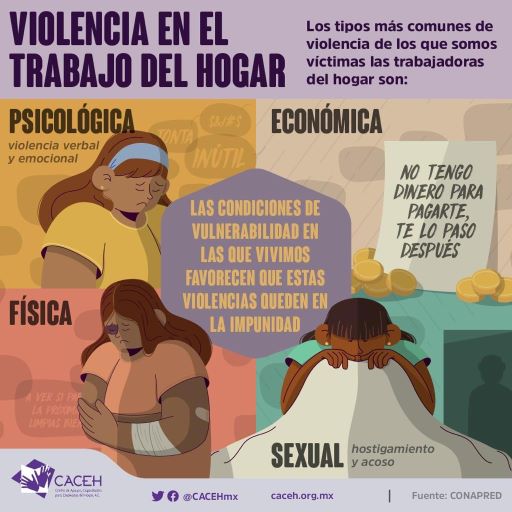This website is hosted by Latin America Bureau (LAB).

Chapter 2: 'Care for those who care' – Domestic workers fight back against violence
This chapter by Marilyn Thomson examines the situations of women working in private households and the different forms of violence they are exposed to in their place of work. It highlights the extent of intersecting violence and discrimination in the sector and the ways in which domestic workers’ organizations throughout Latin America are raising awareness that they are workers and not maids, in their struggle to defend their rights to equality and decent work. It shows that their voices are being heard not least in the international policy arena.

About the author
Marilyn Thomson is an independent gender consultant working on issues such as the rights of migrant and refugee women, violence against women and girls, and the care economy. She lived and worked in Latin America for many years carrying out research and projects with universities, international NGOs, and grassroots women’s organizations, including a domestic workers organization in Mexico. Her PhD thesis focused on the politics of domestic service. She was co-director of the UK-based Central America Women’s Network (which ran from 1992-2017).
Bibliography
Aquino, A.L. (2021), interview with Marilyn Thomson, 1 November, Mexico City (WhatsApp)
Bautista, M. (2022), interview with Marilyn Thomson, 7 April, Mexico City (email correspondence)
CACEH (no date), ‘Identidad cultural y no discriminación de las empleadas del hogar’, https://caceh.org.mx/quienes-somos
CARE (2018) ‘Informe final del estudio de documentación de la violencia y el acoso en el lugar de trabajo contra las trabajadoras remuneradas del hogar en Ecuador, Colombia, México, Honduras y Guatemala’, CARE Regional Programme: Equal Value, Equal Rights & Colectivo de Geografía Crítica del Ecuador, http://igualvalorigualesderechos.org/wp-content/uploads/2021/03/ecare-e.pdf
CARE (2021) ‘Informe alternativo Convenio 189 OIT: avances y retos en Centroamérica, México y República Dominicana’, CONLACTRAHO Foro regional Junio, https://igualvalorigualesderechos.org/foro-regional-informe-alternativo-convenio-189-oit-avances-y-retos-en-centroamerica-mexico-y-republica-dominicana/
CARE & Fundación Bien Humano (2021) ‘Actualización del estado de situación de los derechos humanos y laborales de las trabajadoras remuneradas del hogar en Colombia. Estudio C189. Bien Humano, https://bienhumano.org/wp-content/uploads/2021/03/Estudio-C189-ISBN-comprimido.pdf
CONLACTRAHO (2020) ‘Manual ilustrado del Convenio 190 OIT y su recomendación 206’, https://www.care.org.ec/project/manual-ilustrado-del-convenio-190-de-la-oit-y-su-recomendacion-206/ or https://CONLACTRAHO.org/recurso_cat/publicaciones
CONLACTRAHO (2021) ‘Demanda por la ratificación del Convenio 190 de la OIT’, 23 June, https://www.youtube.com/watch?v=Git50CFeyRU
Conrad, Jenny (2021) ‘Ratifying Convention 190 – how countries are encouraging action on workplace violence’, CARE Insights Development Blog, 25 May, https://insights.careinternational.org.uk/development-blog/ratifying-convention-190-how-countries-are-encouraging-action-on-workplace-violence
Da Silva, N., Granada, L. and Modern, D. (2019) ‘The unheard workforce’, LAWRS, July, pp.8–10, https://lawrs.org.uk/wp-content/uploads/2020/11/Unheard_Workforce_research_2019.pdf
Espinosa Giraldo, A. (2001) ¿Hasta cuándo sin educación? Trabajo doméstico infantil en hogares ajenos en Perú. Bogotá: Save the Children
Goldsmith, M. (2013) ‘Los espacios internacionales de la participación política de las trabajadoras remuneradas del hogar’. Revista Estudios Sociales 45, pp.233–246, https://www.redalyc.org/pdf/815/81525692022.pdf
IDWFED/FITH (2020) ‘Fuertes y unidas enfrentando la pandemia’, 12 June, https://idwfed.org/wp-content/uploads/2022/07/resultados_de_la_encuesta_regional_sobre_el_impacto_del_COVID_19_en_las_trabajadoras_del_hogar.pdf
ILO (2011) ‘C189 – Domestic workers convention, 2011 (no. 189)’, https://www.ilo.org/dyn/normlex/en/f?p=NORMLEXPUB:12100:0::NO::P12100_ILO_CODE:C189
ILO (2013) ‘Ending child labour in domestic work and protecting young workers from abusive working conditions’, https://www.ilo.org/ipec/Informationresources/WCMS_207656/lang–en/index.htm
ILO (2018) ‘Report V (1): Ending violence and harassment against women and men in the world of work’, https://www.ilo.org/wcmsp5/groups/public/—ed_norm/—relconf/documents/meetingdocument/wcms_553577.pdf
ILO (2019) ‘C190 – Violence and harassment convention, 2019 (no.190)’, https://www.ilo.org/dyn/normlex/en/f?p=NORMLEXPUB:12100:0::NO::P12100_ILO_CODE:C190
ILO (2020) ‘Policy brief: ILO violence and harassment convention no.190 and recommendation no. 206’, https://www.ilo.org/wcmsp5/groups/public/—ed_dialogue/—actrav/documents/briefingnote/wcms_749786.pdf
ILO (2022) ‘COVID-19: guidance for occupational safety and health for employers and domestic workers’, https://www.ilo.org/global/topics/safety-and-health-at-work/news/WCMS_834920/lang–en/index.htm
Mlambo-Ngcuka, P. (2020) ‘Violence against women and girls: the shadow pandemic’, 6 April, https://www.unwomen.org/en/news/stories/2020/4/statement-ed-phumzile-violence-against-women-during-pandemic
Moynihan K. (2020) ‘Filmography’, in: Osborne E. and Ruiz-Alfaro S. (eds.) Domestic labor in twenty-first century Latin American cinema. London: Palgrave Macmillan, https://doi.org/10.1007/978-3-030-33296-9_11
Thomson, M (2021) ‘Organisations | Latin American Women’s Rights Service (LAWRS)’, Latin America Bureau, 15 October, https://lab.org.uk/wrv-organisations-lawrs
UN Women/ILO/CLAC (2020) ‘Domestic workers in Latin America and the Caribbean during the Covid-19 crisis’, Brief V.1.1.12.06.2020, https://www.ilo.org/wcmsp5/groups/public/—americas/—ro-lima/documents/publication/wcms_751773.pdf
UN Women (2020) ‘Intersectional feminism: what it means and why it matters’, https://www.unwomen.org/en/news/stories/2020/6/explainer-intersectional-feminism-what-it-means-and-why-it-matters
Chapters
Click through to learn more, find extra information, and access online references:
Women Resisting Violence: Voices and Experiences from Latin America
Chapter 2. ‘Care for those who care’: Domestic workers fight back against violence – Marilyn Thomson
Conclusions and Recommendations
Appendix: Women Resisting Violence, the multilingual podcast
Press release
For press enquiries contact wrv@lab.org.uk. You can find press materials here.



